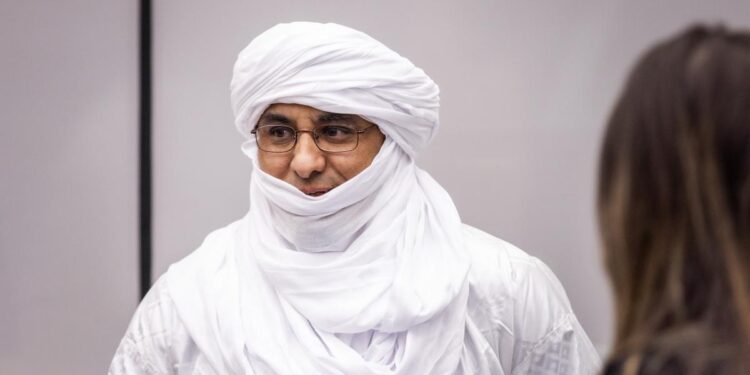The International Criminal Court (ICC) will on Wednesday, June 26, 2024, deliver its verdict in the case of Malian national Al Hassan Ag Abdoul Aziz, who is accused of war crimes and crimes against humanity.
The guilty or innocent judgment will mark a crucial moment in the pursuit of justice for the victims of the atrocities committed in Timbuktu, a cultural heritage site in Mali also known as the “City of 333 Saints”.
Trial Chamber X’s Judge Antoine Kezia Mbe-Mindua (presiding), Judge Tomoko Akane, and Judge Kimberly Prost will rule on the 13 counts of war crimes and crimes against humanity that Al Hassan is facing.
The charges of crimes against humanity include torture, rape, sexual slavery, forced marriages, and persecution. The war crimes charges include torture, cruel treatment, attacks on religious buildings and historic monuments, and sexual violence.
This is the second case before the ICC concerning Mali and the first to address “personal injury” crimes. The first case resulted in the conviction of Ahmed Al-Faqi Al-Mahdi, who was sentenced to nine years in prison for his responsibility in the deliberate destruction of nine mausoleums and the secret gate of the Sidi Yahia Mosque in Timbuktu in 2012.
The case began in January 2013 when the Office of the Prosecutor (OTP) opened an investigation into war crimes in Mali. Al Hassan was surrendered to the ICC in early 2018 by the Malian authorities after an arrest warrant was issued against him. The Pre-Trial Chamber I of the ICC, on September 30, 2019, unanimously confirmed the charges of war crimes and crimes against humanity brought by the Prosecutor against Al Hassan and committed him to trial.
His trial opened in 2020 amid the global Covid-19 pandemic. In the two years that followed, the court heard from 76 witnesses: 52 called by the prosecution, two by the legal representatives of the victims, and 22 by the defence. The closing statements were delivered from May 23 to 25, 2023. The verdict was initially scheduled to be delivered on January 18, 2024, but due to the unavailability of the presiding judge due to health reasons, it was postponed.
Al Hassan’s lawyers have previously argued that he was unfairly targeted for prosecution. Led by Melinda Taylor, his defence told the court that her client just happened to be in the wrong place at the wrong time and had the wrong ethnicity.
RELATED COVERAGE: Forgotten Voices: Uganda’s Children Born of War Want to Belong
“He was religious but not an extremist,” she stated, adding that Al Hassan played no role in the decision to set up an Islamic tribunal in Timbuktu. “As a member of the Islamic police, he was obliged to respect and execute the decisions of the Islamic tribunal.”
They do not, however, deny that he was a member of Ansar Dine.
The charges against Al Hassan cover the events that occurred between April 2012 and January 2013, when Islamist armed groups, Ansar Dine and Al Qaeda in the Islamic Maghreb, took control of the northern regions of Kidal, Gao, and Timbuktu, committing widespread attacks and abuses against civilians.
Over 400,000 residents in northern Mali were displaced as the extremists sexually abused women, looted and pillaged, recruited child soldiers, amputated the limbs of theft and robbery suspects, and subjected many to summary executions. Al Hassan’s Ansar Dine group, among other Islamist groups, also committed atrocities including beatings, floggings, and arbitrary arrests while enforcing their interpretation of Sharia law. The Islamic police meted out atrocities throughout the northern regions of the country.
In one incident, the Islamist groups, on July 30, 2012, stoned to death a man and a woman over a pre-marital relationship in Aguelhoc.
Human Rights Watch (HRW) noted that there was “no meaningful effort to investigate, much less hold accountable, members of the security forces implicated in these incidents.”
Unable to open investigations or hold to account members of the Islamist groups, the government of Mali, which is a state party to the ICC, referred the situation to the court. The OTP visited the country and opened investigations in January 2013.
The upcoming verdict will result in Al Hassan’s conviction or acquittal. For the victims and survivors in Timbuktu, a conviction will represent a potential acknowledgment of the suffering they endured during the dark months of Islamic law in 2012 and a step towards justice and compensation for the victims.
The situation in Mali remains volatile. In January 2024, an Al Qaeda-linked Islamist armed group killed at least 32 civilians, including three children, and set fire to over 350 homes in central Mali, forcing about 2,000 villagers to flee.
In another development, the ICC has unsealed an arrest warrant for Iyad Ag Ghaly, the alleged leader of the Ansar Dine Islamist group. The warrant, issued in 2017, was made public only recently. Ghaly is accused of committing war crimes and crimes against humanity between January 2012 and January 2013.







